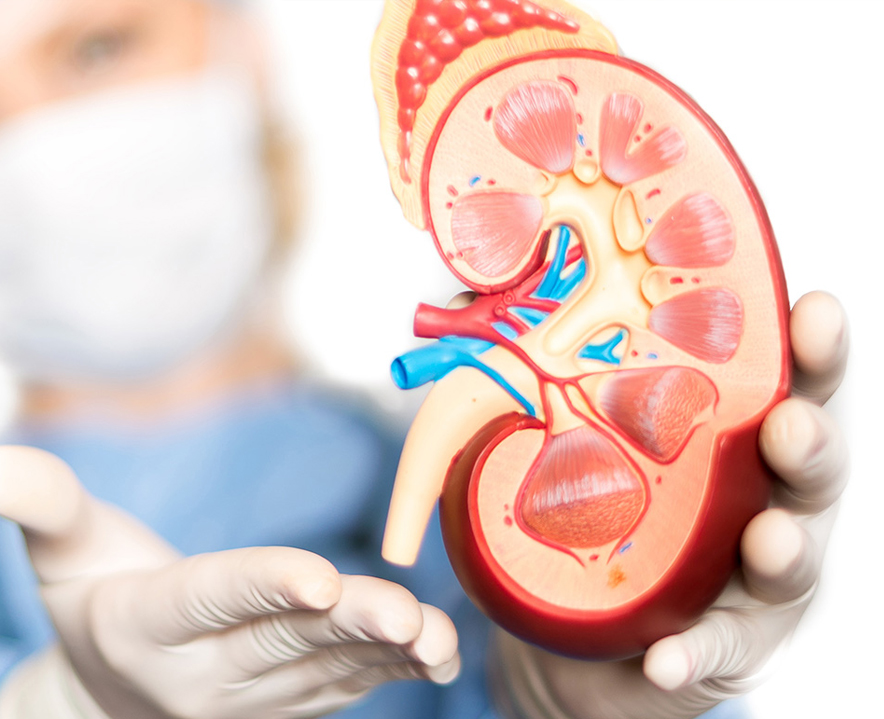Approximately the size of a large fist, the Kidneys are located on either side of the Abdomen. They filter waste out from the blood and dispel it from the body through urine. However, in certain circumstances (ailments or diseases), the kidneys stop functioning. This leads to a toxic build-up of waste causing numerous problems and symptoms. Since the kidneys in your body are also responsible for regulating the electrolytes, any malfunctioning of this organ can cause trouble. Kidney Transplant Surgeries are performed by the best Kidney Doctors in Bangalore to replace diseased kidneys with healthy ones (from donors).
When do Doctors recommend a Kidney Transplant?
Kidney Failures are the main reason that Top Nephrologists in Bangalore recommend Kidney Transplants. Generally, when Kidneys lose about 90% of their ability to function, Kidney Specialists recommend a transplant. Some of the diseases that lead to Kidney Failures are:
- Type II Diabetes: When the body does not process glucose appropriately, the blood sugar levels within the body shoot up. With time, the high sugar levels in the blood vessels begin to destroy blood-filtering units within the Kidneys. This may trigger the failure of the organ.
- High Blood Pressure Levels: Hypertension as it is more commonly referred to, is one of the main causes of Kidney Failure. With this disease, the arteries around the Kidneys become narrower or weaker. Such arteries may not be able to supply enough blood to the Kidneys denying them vital nutrients and oxygen.
- Polycystic Kidney Disease: If you know of family members suffering from this disease, then it is best to stay ahead of it with regular screening. Polycystic Kidney Disease is a genetic disorder where fluid-filled sacs begin to form in the Kidneys. This prevents the Kidneys from functioning normally. Visit Blue Bliss Hospitals for consultation or screenings as it is the best Kidney Hospital in Bangalore.
- Glomerulonephritis: Glomeruli are small filters found within the Kidneys. Any inflammation of these filters may hamper the functioning of the Kidneys.
The Kidney Transplant Procedure:
- The transplant procedure is finalised only after confirmation that a suitable donor is available. Here is what you can expect from the procedure.
- After an incision is made in the lower part of the abdomen, the healthy Kidney is placed inside. The damaged Kidneys are not removed unless they present specific complications such as infection, stones, or hypertension.
- The healthy Kidney’s blood vessels are meticulously attached to the blood vessels in the lower part of the abdomen.
- Finally, to complete the procedure, the ureter from the new Kidney is attached to the patient’s Bladder.
The Risks Associated with Kidney Transplants
Blue Bliss Hospital is the best Kidney Transplant Hospital in Bangalore. Make sure you consult with the experienced Nephrologists here to understand the risks associated with the procedure. Here’s a brief idea of what you may expect:
- An adverse reaction to Anaesthesia is a common risk
- Blood Clots
- Ureter Blockage
- Internal Bleeding
- Rejection of the Kidney by the body
- Heart Attack or Stroke
- There is also a risk of the donated Kidney failing
Criteria, Requirements and Finding a Donor
There are several things that Kidney Doctors in Bangalore check before confirming that a patient is fit for a transplant. Some of those are:
- Patients must be healthy enough to handle the surgery and the lifelong commitment to medication that is required.
- Pre-existing conditions will be thoroughly examined, and if there are too many other issues, doctors may not consider them ideal candidates.
- If the transplant is to be successful, patients must give up smoking, alcohol or drug addictions.
Apart from the criteria above, one of the most important stages is to find a suitable donor.
- When the kidney of a person who has died in an accident is transplanted to a patient, it is known as a Cadaveric Donor. The number of such donations is quite low in India.
- It is possible to live a healthy and happy life with just one functional kidney. Therefore, family or friends who match the requirements may become donors. Familial donors are encouraged as there is a greater possibility of the body accepting the organ. India is in second place (after the US) for live Kidney Transplants.
- There is extensive testing done to ascertain if the Donor Kidney is suitable. Not only do they check for Blood Type, but donors will also be checked for Tissue Typing (Genetic Markers).
- The last stage in the matching process is doing a crossmatch. Here, a small portion of the patient’s blood is mixed with the donors. The antibody reaction to the antigens present in the donor’s blood is noted to see if there may be a reaction (negative or positive).
Recovery and After-care
Apart from ensuring all medications prescribed by the nephrologists are being taken religiously, patients will have to take care of their nutritional needs. Doctors will prescribe a list of foods that must be consumed and avoided. Once patients have recovered, they must attempt to lead a healthy lifestyle along with a moderate amount of exercise.
